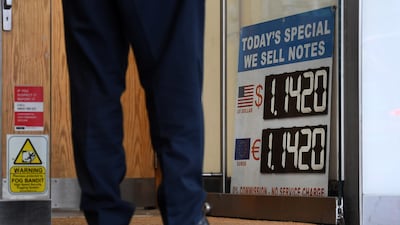The British pound marked the 30th anniversary of Black Wednesday by falling to fresh lows on Friday, on the back of bleak retail sales data.
Black Wednesday, also known as the Sterling crisis, occurred on September 16, 1992.
On Friday, the currency slumped more than 1 per cent to $1.1351, the lowest level since 1985.
Retail sales volumes dropped by 1.6 per cent in monthly terms in August, data released by the Office for National Statistics showed.
That represented the biggest fall since 2021, far worse than the expectation of 0.5 per cent and the sharpest slump in eight months.
It was another sign that the economy is sliding into recession.
“Today’s retail sales data just released were terrible,” said MUFG analyst Derek Halpenny.
“The sterling-dollar exchange rate has further to fall in circumstances of increased financial market volatility.”
The pound has fallen about 16 per cent this year, mainly due to the strong dollar, but uncertainties over the new government’s plan to freeze energy bills via vast borrowing as it cuts taxes to stimulate the economy have also played a part.
The government's strategy does have the support of some economists, however.
“Liz Truss and her chancellor can expect howls of criticism from establishment economists and their cheerleaders when they hit the accelerator on their reforming agenda at next week's expected mini-budget,” said Patrick Minford, an economist who is professor of applied economics at Cardiff Business School, Cardiff University.
“They shouldn't listen. The idea that there's going to be a 'sterling bond market crisis' is for the birds.”
The fresh plunge in the pound occurred on the 30th anniversary of Black Wednesday, occurred when the UK Government was forced to withdraw sterling from the European Exchange Rate Mechanism (ERM).
Brought in to stabilise European currencies in preparation for the introduction of the euro, the ERM required countries seeking to replace their currency with the euro to keep the currency in a specific range for several years.
The UK had been in the ERM for two years at the time it was forced to withdraw.


